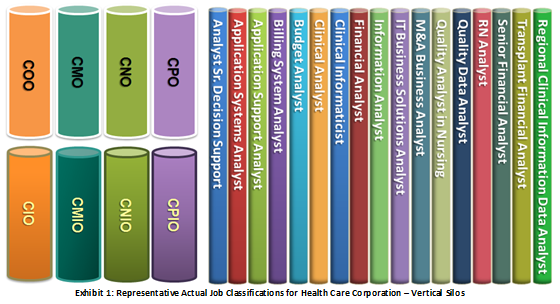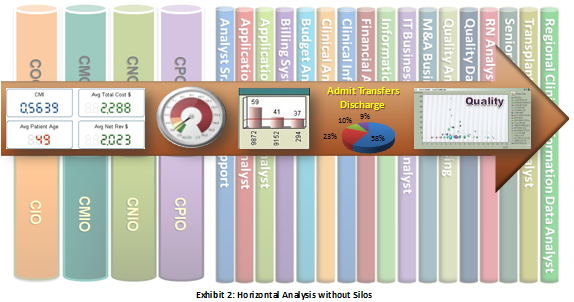Becker's Healthcare published a very interesting article this week, CFOs taking on IT roles: Is this trend headed for healthcare?
Ayla Ellison describes in the article how other industries are combining C-suite roles, specifically the CFO and CIO, and that "it is challenging for most CFOs and CIOs to do all that is required of one role. That issue will likely prevent the trend from taking off in healthcare." With the rapid changes in technology, it is important to have a CIO/CTO. One issue happening in healthcare that is not generally discussed is the expansion of the C-suite, which has also created an increase of analysis silos.
The administrative body for healthcare has rapidly expanded from President, Vice President and Administrators, to:
CEO - Chief Executive Officer;
COO – Chief Operations Officer;
CFO – Chief Financial Officer;
CIO – Chief Information Officer;
CTO – Chief Technology Officer;
CNO | CNE – Chief Nursing Officer or Chief Nurse Executive;
CMO – Chief Medical Officer; as well as new positions of
CHIO – Chief Health Information Officer | VP of Informatics;
CQO – Chief Quality Officer;
CSO – Chief Strategy Officer;
CMIO – Chief Medical Information Officer;
CPO – Chief Population Officer;
CXO – Chief Patient Experience Officer;
CNIO – Chief Nursing Information Officer; and
CPIO – Chief Population Information Officer.
This growing segregation of users and data is causing those at the operational level to be more data rich-information poor, with expanding independent analysts analyzing in silos, predominately without healthcare experience.

The growing segregation hinders providing new insights into what is happening at root levels, and prevents maturing of methodologies as analytic tools are being implemented with use of historical reporting practices. The void between IT and those who need the data is widening as these segregated initiatives are requiring more and more resources. The silo'ed C-roles are detrimental when the gatekeepers of the data are the bottlenecks for meaningful analysis, or when C-level leaders are the most entrenched in historical reporting and practices.
The mantra over the past 40 years in healthcare has been resistance to change – the industry no longer has the luxury to operate and analyze data the same way expecting different results. To address healthcare of the future, there needs to be new data correlations and practices to provide insights. One strategy is start small, be effective, and enable leaders across departments to 'speak the same language' with combined clinical, financial, operational and outcomes information. In short, perform horizontal analysis based on strategies and initiatives.

By performing horizontal analysis using correlated cross functional data based on episodes-of-care and care initiatives, analysis silos are eliminated. And as a result, insights and inefficiencies are uncovered while asking the right questions with supportive data, requiring a fewer number of analysts. Information is then disseminated from high level actionable information in the hands of the C-suite, to streamlined, accurate information for sound decision making in the hands of those providing actionable transformation for quality care and operational efficiency.
Can healthcare combine some of the C-suite roles? The more important focus is the breaking down of the information silos preventing them from working together, allowing the crossover of information with the possibility of merging roles such as quality and patient experience, and the various information officer roles.
Rose Rohloff is a 30+ year healthcare veteran with a background of nursing, business and information systems with success creating industry leading business intelligence solutions for meaningful analysis. Her focus is the removal of information silos within health systems, and the expansion of the care continuum to a health maintenance continuum. Rose Rohloff can be contacted at rosemrohloff@outlook.com
The views, opinions and positions expressed within these guest posts are those of the author alone and do not represent those of Becker's Hospital Review/Becker's Healthcare. The accuracy, completeness and validity of any statements made within this article are not guaranteed. We accept no liability for any errors, omissions or representations. The copyright of this content belongs to the author and any liability with regards to infringement of intellectual property rights remains with them.


